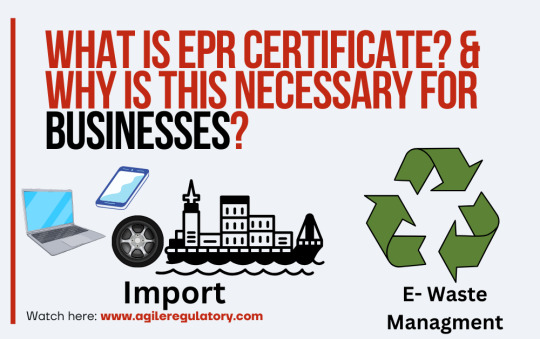#eprregistrationforewaste
Text
What is the EPR Registration Process?

Overview of EPR Certificate
Companies that accept accountability for the full life cycle of their products—particularly about post-consumer waste management—are awarded the EPR Certificate. This certification shows a dedication to sustainable practices and environmental responsibility. It entails following legal standards, showcasing environmentally friendly product design, and actively taking part in waste reduction campaigns. A company's legitimacy is increased by EPR Certification, which promotes trust among stakeholders and customers. It guarantees adherence to environmental regulations and is consistent with global sustainability goals. In the end, it helps create a circular economy and demonstrates a company's commitment to excellence in environmental stewardship.
Role of CPCB
Central Pollution Control Board, which is in charge of monitoring and controlling environmental compliance in India, is essential to EPR certification. To make sure that businesses handle their products appropriately, CPCB creates standards and guidelines for extended producer responsibility (EPR). It keeps an eye on compliance with these rules, which cover appropriate recycling and trash disposal procedures. In order to preserve ecological sustainability, lessen the ecological impact, and encourage ethical business practices, the CPCB's engagement is essential. By virtue of its regulatory powers, CPCB helps ensure that businesses respect their environmental obligations and promotes a circular economy by helping to enforce EPR principles.
Types of EPR Certificate:
EPR Certificate for E-Waste
EPR Certificate for Plastic Waste
EPR certificate for Battery Waste
EPR Certificate for waste Tyres
EPR Certificate for E-Waste
EPR Registration for E-Waste means companies that make or sell electronic stuff must take care of their products even after we're done using them. They need to collect, recycle, and get rid of electronic waste in a way that's good for the environment. This helps to keep our surroundings clean, reuse materials, and make sure old electronic gadgets don't harm nature or people.
EPR Certificate for Plastic Waste
EPR Registration for Plastic Waste means companies need to take care of the plastic products they produce or sell. They must handle everything about these plastics, from making them to collecting, recycling, and properly getting rid of them when people are done using them. This is to keep our environment cleaner and reduce the problems caused by plastic waste. It's like a rule that companies must follow to be more responsible for the plastic things they create.
EPR certificate for Battery Waste
EPR Registration for Battery Waste means that companies are responsible for managing batteries from production to disposal. They have to ensure that batteries are collected, recycled, or properly disposed of after use. This helps prevent environmental harm and encourages companies to be more accountable for the impact of battery waste. In simple terms, it's a rule for companies to take care of the batteries they make, use, and sell, promoting better environmental practices.
EPR Certificate for Waste Tyres
EPR Registration for Waste Tyres means that companies are accountable for the entire lifecycle of tyres they produce or use. This includes proper disposal, recycling, or management of tyres after they are no longer in use. The aim is to reduce environmental impact and encourage responsible practices in handling tyre waste. In simple words, companies need to take care of the tyres they manufacture or use, ensuring they are disposed of in an environmentally friendly way.
Benefits of EPR Certification
1. Environmental Stewardship: By actively participating in the responsible management of product life cycles, the certificate indicates a commitment to environmental stewardship.
2. Regulatory Compliance: EPR Certification ensures that regulatory standards are met, lowering the risk of legal problems and penalties.
3. Enhanced reputation: Organizations who receive EPR Certificates show their dedication to sustainable and ecologically conscious business operations, which enhances their reputation.
4. Competitive Advantage: A company gains a competitive edge with certification, which demonstrates a dedication to responsible product management and increases the organization's appeal to stakeholders and environmentally sensitive consumers.
5. Incentives for Innovation: EPR promotes enterprises to develop in product design by supporting eco-friendly methods and lowering product environmental effects.
6. Decreased Financial and Legal Risks: EPR standards compliance reduces legal and financial risks by adhering to set standards for waste management and responsible product disposal.
7. Alignment with Global Goals: By encouraging ethical waste management and resource conservation, EPR Certification helps to achieve global sustainability goals.
8. Consumer Trust: By providing reassurance that the business is actively reducing its environmental impact, EPR Certification helps to build consumer trust.
9. Morale Among Staff: Positive corporate cultures are fostered and employee morale is raised when they work for organizations that practice social responsibility and environmental responsibility.
10. Community Relations: Businesses who possess EPR Certificates show a dedication to sustainable practices and environmental protection, which strengthens ties with the community.
Conclusion
Finally, the EPR Certificate is an important credential that goes beyond statutory compliance, indicating a company's dedication to environmental sustainability. It provides various advantages, including increased credibility, regulatory adherence, and a competitive advantage. EPR certification helps organizations fit with global sustainability standards, promotes innovation, and lowers legal and financial risks. Furthermore, it increases consumer trust, raises employee morale, and improves community connections. As businesses pursue responsible and sustainable operations, the EPR Certificate emerges as a sign of conscientious corporate citizenship, helping to create a healthier planet and a more sustainable future.
#epr#eprcertification#eprcertificate#eprlicense#eprauthorization#eprregistrationforewaste#eprregistrationforplasticwaste#eprregistrationforbattery#cpcb#eprewaste#eprelectronics#eprplastics
0 notes
Text
EPR certificate, Types of Documents, Process, and Benefits.
#epr#eprlicense#eprregistrationforewaste#epr certificate#epr registration#ewastedisposal#ewasterecycling#ewastemanagement#eproctophilia#ewaste#cpcbeprregistration#cpcbepr#cpcb#agileregulatory#compliance#importers
0 notes